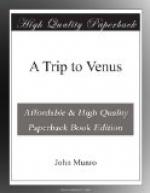We travelled league after league of this paradise run wild (I cannot tell how many) without noticing any change in the character of the scenery. At length, however, it grew less savage by degrees, and we entered on a park-like country which gained in loveliness what it lost in grandeur. Low hills, clad from base to summit in masses of gorgeous bloom, and mirrored in sequestered lakes fringed with pied water-lilies; groves of majestic cedars inviting to repose; rambling shrubberies and evergreen trees festooned with flowering vines; brooks as clear as crystal, murmuring over their pebbly beds, now hiding under drooping boughs, now lost in brakes of tall reeds and foliage plants; grassy meadows gay with crocusses, hyacinths, and tulips, or such-like flowers; isolated rocks and boulders mantled with vivid moss and lichens; hot springs falling over basins and terraces of tinted alabaster; clustering palms and groups of spiry pine-trees; geysers throwing up columns of spray tinged with rainbows; all these and a thousand other features of the landscape which must be nameless passed before our view.
Again and again we startled some herd of wild quadrupeds or flock of gaudy birds unknown to science. Legions of large and burnished insects, veritable living jewels, might be seen everywhere, and flaunting butterflies hovered about the car. So far we had not observed the least sign of human occupation, and yet, as Gazen remarked, the appearance of the country seemed to betray the influence of art. It had not the wild and wasteful luxuriance of the earlier tract, of a region left entirely in the hands of Nature, but rather of a paradise which had been dressed and kept by the gods.
Owing to the height at which we were travelling, and the undulating character of the surface, we could not see very far ahead. At length, however, on emerging from a gap in a range of hills, we came upon a vast plain or prairie stretching away into the distance, and there in the blue haze of the horizon we saw, or fancied we saw, the architecture and gardens of a great city, on the borders of a lake, and above the lake, suspended in mid-air, a spectral palace, glittering in the sunbeams.
We raised a shout of joy and triumph at this discovery.
“Stop a minute, though,” said Gazen, and a shade of doubt passed over his face. “Perhaps it is only a mirage.”
We levelled our glasses at the distant scene, and scanned it with palpitating hearts. We could discern the general shape, and even the details of many houses, and the roofs and minarets of the palace, which was evidently built on the top of an island in the midst of the lake.
“That is not a phantasm,” said I at last; “it is a real city.”
Gazen made no reply, but turned and silently shook me by the hand. The tears were standing in his eyes.
A delightful breeze, fragrant with innumerable flowers, mantled the long grass of the prairie which was threaded by a maze of silver streams, and diversified with bosky woodlands. Ere long we observed fantastic cottages and picturesque villas nestling in the coppices, and as may be imagined we were all on tip-toe with curiosity to catch a sight of their inhabitants. We were anxious to see whether they looked like human beings, and how they were disposed towards us.




